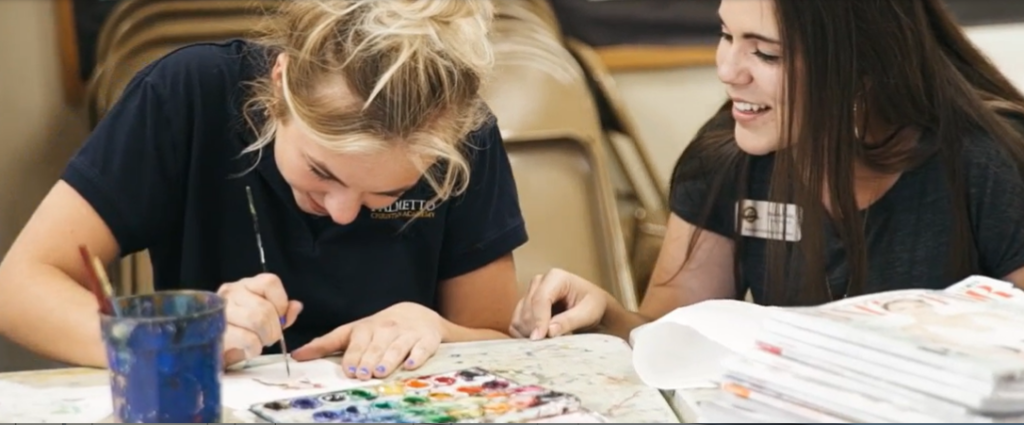
Editor’s note: This commentary from Jonathan Butcher, the Will Skillman senior research fellow in education policy at The Heritage Foundation, is an exclusive to reimaginED.
Shelricka Burnside is a single mother of three, so she is well acquainted with life’s challenges. She can recognize problems even from afar and wants desperately to help her children avoid them.
Burnside told the Palmetto Promise Institute in South Carolina, “The statistics show that black males a lot of times tend to drop out of school,” which is now her concern for her 9-year-old son. Understanding that learning values about faith and family at a young age will be essential for him, she adds: “That’s going to help him throughout life.”
Parents like Burnside now can celebrate the opportunities available to thousands of students across the U.S. this year because state lawmakers made them eligible for education savings accounts. South Carolina has become one of more than a half-dozen states where policymakers created or expanded parent options in K-12 education this legislative session through education savings accounts or account-style learning options.
South Carolina’s accounts will be available to children from families with household income levels less than or equal to 200% of the federal poverty line in 2024-25 (equivalent to approximately $60,000 for a family of four). Eligibility will expand in 2025-26 to 300% of the poverty line and again in 2026-27 to students in households earning up to 400% of the poverty figure. Students must be attending a public school in the year they apply for an account.
Similar to the accounts in Arizona and Florida, South Carolina officials will deposit a portion of a student’s spending from the state education formula into a private account that parents use to buy education products and services for their children. Families can buy textbooks, hire personal tutors, find education therapists, pay tuition at a private school, and more, in any combination they choose.
Parents got another glimpse of the problems on the horizon for young children last week with the release of national test scores for eighth graders in history and civics. Results released last October on the Nation’s Report card found the largest drop in history in math scores between test administrations with corresponding declines in reading. In history and civics, student scores have dropped back to levels not seen since the mid-1990s. They have lost more than a generation’s worth of progress.
The math and reading results point to problems for a student later in their education career and perhaps even affecting their job prospects. But the sinking history and civics scores foreshadow tears in any remaining sense of national identity Americans may share after the shredding caused by COVID and the social upheavals in recent years.
Taxpayers and families’ confidence in schools and government services has worn thin after the pandemic, and we are looking for something on which to set our hopes for the future. Ignorance about our past and the sacrifices that it took to arrive at this point in history are not reassuring.
Some 60 years ago, the essayist E. B. White wrote, “If democracy is going to save its skin, it had better hustle.” Indeed.
Parents like Shelricka Burnside already are motivated to move quickly, and now more state policymakers are catching up. Allowing families to choose how and where their children learn not only can satisfy those justifiably frustrated by assigned schools’ bureaucracy and seemingly routine parade of disappointing results.
It also can hem together the lining of freedom and virtue, our permanent institutions, which allow us to find meaning in the living and working and striving Americans do each day.
Parents hold their children in their thoughts because they are special to them. We have to remember to hold America in our thoughts, too, “like holding a love letter,” White says, because “it has so special a meaning.”
Let’s put this in the mail to the next generation.



[…] for its voucher and tax-credit scholarship policies to about 97% of K-12 students statewide. South Carolina’s new ESA is limited to low- and middle-income families, while Montana’s new ESA will expand education […]
[…] for its voucher and tax-credit scholarship policies to about 97% of K-12 students statewide. South Carolina’s new ESA is limited to low- and middle-income families, while Montana’s new ESA will expand education […]
[…] for its voucher and tax-credit scholarship policies to about 97% of K-12 students statewide. South Carolina’s new ESA is limited to low- and middle-income families, while Montana’s new ESA will expand education […]
[…] for its voucher and tax-credit scholarship policies to about 97% of K-12 students statewide. South Carolina’s new ESA is limited to low- and middle-income families, while Montana’s new ESA will expand education […]
[…] for its voucher and tax-credit scholarship policies to about 97% of K-12 students statewide. South Carolina’s new ESA is limited to low- and middle-income families, while Montana’s new ESA will expand education […]
[…] for its voucher and tax-credit scholarship policies to about 97% of K-12 students statewide. South Carolina’s new ESA is limited to low- and middle-income families, while Montana’s new ESA will expand education […]
[…] for its voucher and tax-credit scholarship policies to about 97% of K-12 students statewide. South Carolina’s new ESA is limited to low- and middle-income families, while Montana’s new ESA will expand education […]
[…] for its voucher and tax-credit scholarship policies to about 97% of K-12 students statewide. South Carolina’s new ESA is limited to low- and middle-income families, while Montana’s new ESA will expand education […]